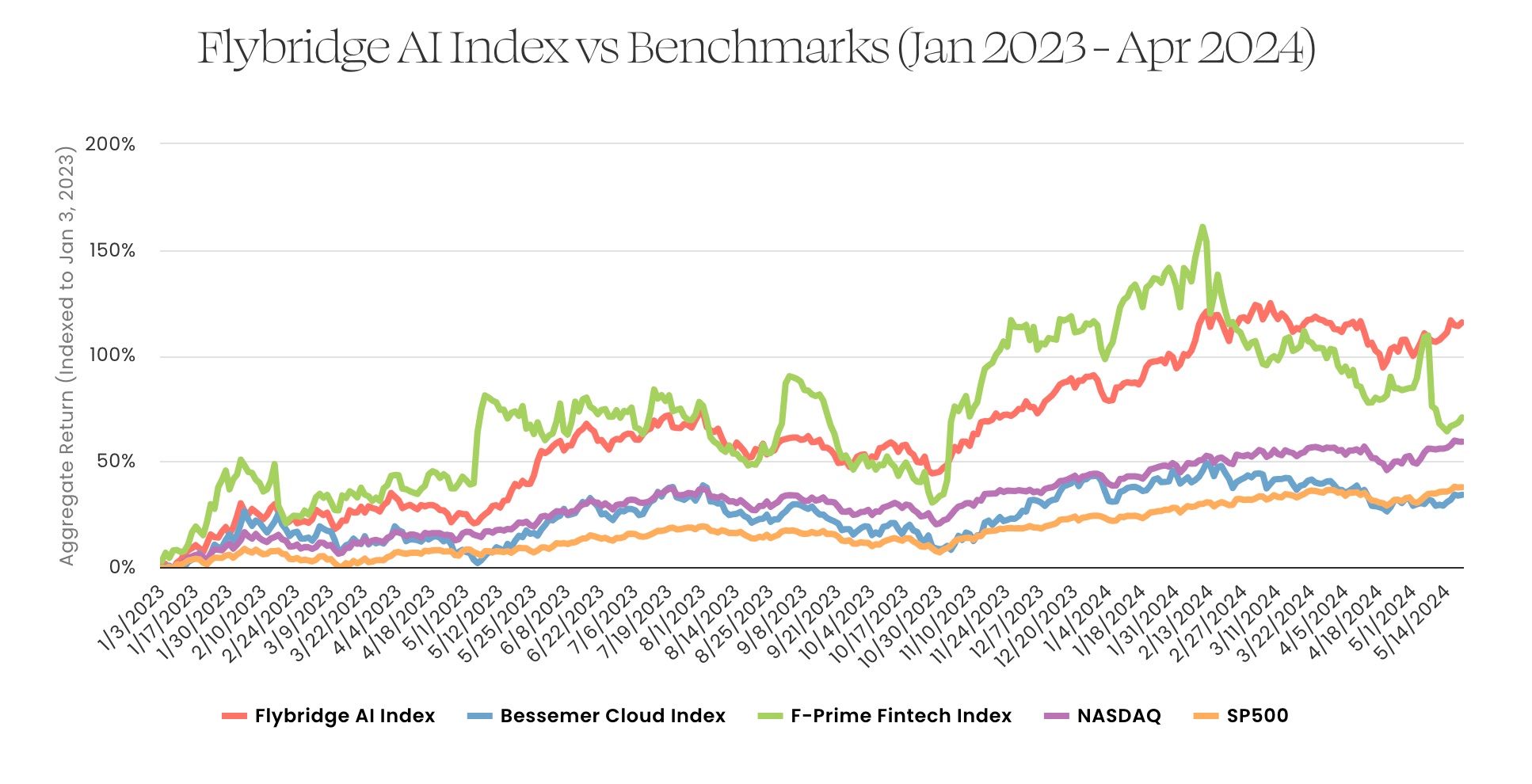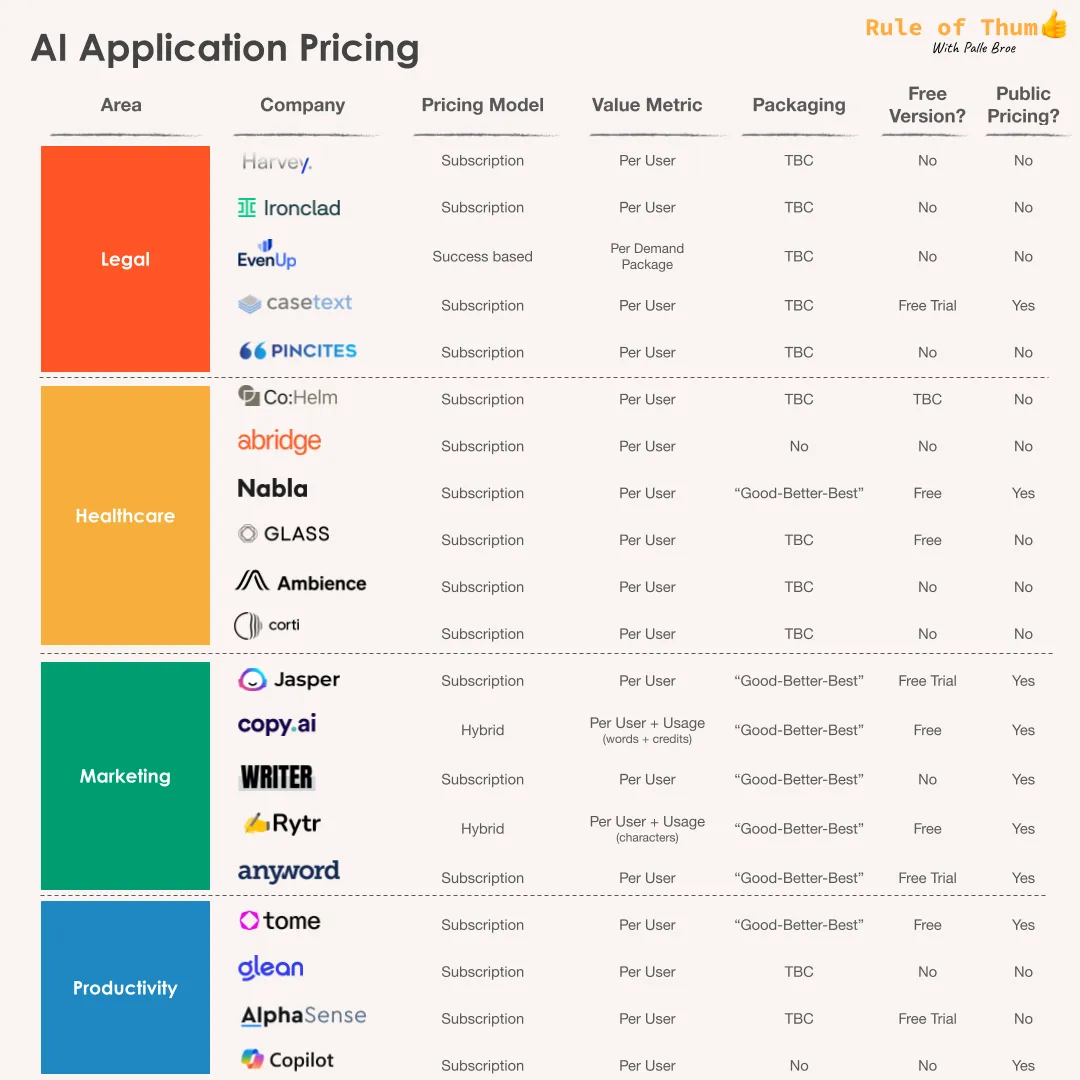AI and Business
Wharton Professor of Innovation and Entrepreneurship Serguei Netessine proposes you think of generative AI as “WINS” (Words, Images, Numbers, and Sounds”). Each will have a disparate effect (or non-effect) on businesses depending on the degree of digitalization.

Resources for business
Read InvestAI, a weekly dialog between Sami Karam (editor of The Wednesday Letter) and Richard Sprague. Timely discussions of AI and its relevance to investment managers. No stock-picking, just general useful high-level background such as what LLMs can’t do, lesser-known businesses that will be affected, and more.
Ed Nevraumont, senior advisor at an investment firm, writes the Marketing BS newsletter and keeps a detailed spreadsheet of useful AI tools for companies including sales support tools like Collectivei.com ($9K/year)
TheNeuron lists the 27 top AI applications for business
Monitor the performance of public companies realizing the promise of Artificial Intelligence Flybridge AI Index

Startups
Accounting
A16Z summarizes the implications for the accounting business Generative AI in Accounting

Crypto
Education
Ryan Watkins on update your syllabus for ChatGPT suggests asking students to track changes while editing the chatGPT response.
Employment
For software development impact, see Developers and what they’re up to
Networking
Even the most out-going and gregarious among us knows the awkwardness of standing there with your cocktail, trying to think how to get away from this boring guy so you can chat with somebody more appropriate.
See Swizec.com : using AI to spark connections at a conference
Microsoft/LinkedIn Work Trends Report
Microsoft/LinkedIn 2024 Work Trend Report based on a survey of 31,000 people worldwide
Key takeaways
- CoPilot users read 10% fewer emails and edited roughly 10% more Word/Excel/Powerpoint documents
- AI didn’t seem to affect the number or length of meetings, but the heaviest 5% of users saved almost an entire workday/week thanks to the summarization features.
Management
Ethan Mollick speculates on how AI-based organizations will look: Reshaping the tree: rebuilding organizations for AI with examples of how his own Wharton startup works. Team members generate their project summaries and questions and let AI summarize and provide suggestions before a meeting.
Because AI is like a person, he thinks individual teams should develop their own best practices for using AI.
Apr 9 Tomas Pueyo AI and the Future of Work (8 minute read)
Anthropic’s latest AI, Claude, achieves high scores on Mensa tests, signaling proximity to self-improving AI and posing both opportunities and existential risks. Machine learning is already displacing jobs, as evident at Klarna, where a customer service AI replaced 700 agents, hinting at an accelerating trend in automation. Duolingo’s recent layoffs due to AI’s translation capabilities further underscore this shift, emphasizing the growing impact of AI on the future of work.
Marketing
Chris Silvestri (Why Talk to Customers When You Can Simulate Them? documents how for under $5 and a couple hours work, he used Gemini 1.5 Pro to simulate three different customers (details are paywalled)
Here’s how it works: Instead of just imagining what your ideal customer wants, you can actually have a conversation with an AI model that mimics their persona. You can prompt it with detailed information about your target customer—their demographics, goals, pain points, even their favorite industry websites. Then, you ask the AI questions, just as you would in an interview with a human customer. How would they describe their biggest challenge? What features are most important to them? What are their objections to your product?
Perplexity auto-generated this Best AI Marketing Books:
- Marketing Artificial Intelligence: AI, Marketing, and the Future of Business by Paul Roetzer
- The AI Marketing Canvas: A Five-Stage Road Map to Implementing AI in Marketing by Raj Venkatesan and Jim Lecinski
and more…
Retail
Jasper.ai compiled a summary of how AI will affect retail: conversational commerce, content generation, matching customers to products, etc.
Although the piece runs with an apparently human by-line and contains many external links, beware: Jasper.ai is itself an AI-generating content tool.
Advice for AI Company Builders
“AI is in the solution space, not the problem space”, says As Smart Bear in “AI startups require new strategies: This time it’s actually different”. There’s no such thing as an “AI market; incumbents have most of the advantages because AI is a straightforward upgrade to existing processes. Standard”Disruption Theory”, says incumbents ignore new technologies because they’re not as good as what they already have. But that doesn’t apply here, because the big companies can find immediate use for AI. This makes it tough for startups, but:
Still, the right way to analyze this is not to say “the AI market is big and growing” but rather: “Here is how AI will transform this existing market.” And then: “Here’s how we fit into that growth.”
Sangeet Paul Choudary explains that generative AI is a good way for startups to lose
Unlike the transition from on-prem to SaaS, he says, when incumbents needed to rewrite everything to compete with the entirely new way of work pioneered by companies like Salesforce, generative AI is relatively easy to incorporate into existing technology stacks. Instead, he proposes that startups focus either on “model-only” applications like MidJourney, or on “workflow+model” vertical applications like Harvey for the legal industry.
And Ashu Garg from Foundation Capital offers these suggestions based on interviews with leaders:
- Co-founder of Databricks Matei Zahari says instead of using LLMs like a fancy database:
leverag[e] LLMs for their language analysis and generation skills while sourcing factual, up-to-date information from trusted external sources through retrieval mechanisms and tool calling.
- and Robert Nishihara, Co-founder & CEO of Anyscale pushes open source
With the rapid advancement of AI technology, it won’t be long before open-source models are “good enough” for the majority of business tasks. The natural progression from here is to develop smaller, task-focused models using proprietary company data. As Robert puts it: “You’re going to need small, fast models. And task-specific models have a huge advantage when it comes to cost and speed because you can achieve the same quality with a smaller model if it’s specialized.”
Revenue

